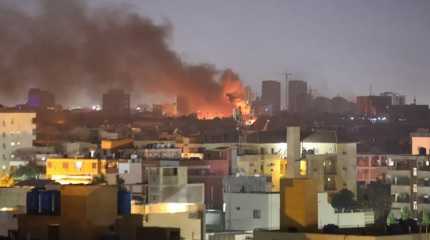
29 Apr 2023; MEMO: The United Nations (UN) revealed on Friday that at least 40,000 refugees had fled the Sudanese capital, Khartoum, in search of a safe place, following armed clashes in mid-April.
This statement was made in a speech delivered by the UNHCR Representative in Sudan Axel Bisschop, at a press conference in Geneva, Switzerland.
Bisschop warned of the dangers facing the forcibly displaced people in Sudan and those fleeing the intensified fighting, including refugees in Sudanese cities.
Bisschop shared: "We have received reports that around 33,000 refugees have fled Khartoum to find safety in the refugee camps in White Nile State, 2,000 to the camps in Gedaref, and 5,000 to Kassala since the crisis started unfolding two weeks ago, once again fleeing for their lives."
Bisschop described the refugees as "newly displaced", noting: "Innocent civilians, including women and children, will only continue to suffer."
He added: "As hostilities flare in Sudan, UNHCR, the UN Refugee Agency, is warning that the conflict is having a devastating impact on the civilian population, including refugees and internally displaced people across the country."
Bisschop pointed out: "The Refugee camps in Gedaref, Kassala, White Nile and Blue Nile, as well as refugee settlements in South and West Kordofan, are so far relatively calm with essential services running, including health and water."
Ethiopian media reported that Sudan hosts about one million refugees from the Tigray region, which suffered armed clashes between the Ethiopian army and elements of the Tigray Liberation Front for two years.
Earlier on Friday, the International Organisation for Migration announced that Chad had received at least 20,000 refugees from Sudan amid the ongoing clashes, including Sudanese citizens and refugees residing there.
According to UN data, Sudan already hosts a record number of 1.3 million refugees.
Sudan's Doctors Syndicate announced on Friday that the number of civilian deaths had risen to 387 since the start of the clashes between the army and the Rapid Support Forces in mid-April, in addition to more than 1,000 injured.
The clashes also caused the displacement of thousands of people to neighbouring countries and the evacuation of foreign nationals from all parts of Sudan.
Since 15 April, a number of Sudanese states have been witnessing massive clashes between the army, led by Abdel Fattah Al-Burhan, and the Rapid Support Forces, led by Mohamed Hamdan Dagalo, known as Hemetti.




